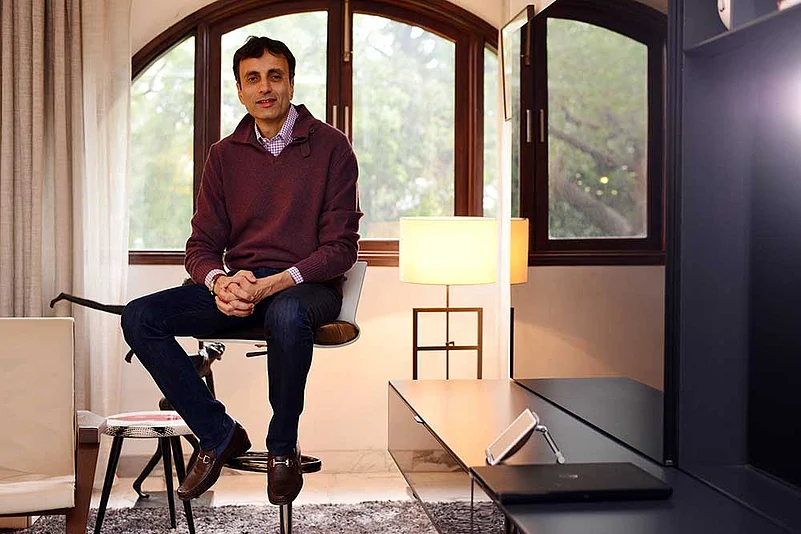The election season is well upon us, with PM Narendra Modi aggressively seeking a second term, the Congress struggling with the dilemma whether to flex its shrunken muscles or make peace with strong regional parties by agreeing to play second fiddle, and other Opposition parties trying to forge a united front.
For anyone trying to make sense of the dynamics of Indian democracy with some historical perspective, New York-based investment manager Ruchir Sharma’s book is a handy companion. Democracy on the Road is a travelogue through the country’s political landscape spanning nearly three decades, covering Lok Sabha polls from 1998 to 2014 and assembly elections till December 2018. It’s racy and anecdotal, a slog through the rough and tumble of the countryside, unveiling India’s myriad colours. It also glimpses into the fears, insecurities and quirks of politicians, and the expectations and aspirations of the electorate.
Like Laloo Prasad Yadav playing the genial buffoon as he introduces his horses and cows by their names and asks his wife for names of his nine children; Manmohan Singh sulking after losing Lok Sabha polls from South Delhi, vowing never to contest again and then in 2004, asking the author “with deadpan humility that was classic Singh” to pray for him after he was made prime minister.
Sharma also recounts a meeting with Mayawati in the run-up to the UP assembly polls in 2002 and being completely disarmed by her “hospitable and respectful” welcome to him, a Brahmin. Highlighting politicians’ lack of privacy, he writes about the Dalit leader greeting visitors in her bedroom, dressed in a nightgown, reading newspapers. Her first words: “Let me first do my Colgate,” and off she went to brush her teeth.
The book is full of such delightful nuggets as Sharma reveals the vagaries of politics. Southern politics and politicians are a different ballgame altogether—theatrical and larger-than-life. For Sharma, this was personified in Vijayaraj ‘Captain’ Vijayakanth, a former Tamil film star and the leader of a “ragtag coalition of minor parties”. When asked if he could be the kingmaker in a putative coalition government, the Captain, his eyes bloodshot, sitting in his bed wearing a sleeveless vest and a lungi at noon, responded in filmy style: “I am not the kingmaker. I am the king.” Then he raised his arm to show off his muscles and let out a roar. The book also reminds readers about how politics changes politicians. TDP leader Chandrababu Naidu, who once spoke about development and cutting subsidy to invest in primary education, infrastructure and technology to global investors, had to resort to welfarism when he went to his voters.
Indian voters, Sharma realises, are not easy to please, as they dump incumbent candidates in two-thirds of all elections. That is why leaders like Naidu and Nitish Kumar lean towards welfarism and freebies, toning down their development agenda. Also, with caste equations continuing to play a crucial role, parties are forced to keep that a foremost criterion in ticket distribution and forming alliances. The book brings out the fragility of alliances, political promiscuity and caste that continue to plague Indian democracy.
It also has a running theme of economic reforms and how leaders are measured on that count. As Sharma went seeking the free-market reformer—someone like Deng Xiaoping, Vladimir Putin or Erdogan—he realised that Sonia and Rahul Gandhi were “burdened by their fundamentally socialist ideology”. About Manmohan, he surmised that “despite the depth of his intelligence and his understanding of economics, he did not have the larger-than-life charisma of mass-based leaders who might have been able to sell reform in India too.”
About Modi, Sharma had hoped he would follow Edrogan’s path and focus more on economic issues, and maybe he would be a transformational leader—Ronald Reagan of India. According to the book, Modi has belied those hopes and been “a performer and not a reformer”.
Sharma’s travels over three decades—equal to a lap around the Earth—have convinced him about a few things. One, India's political DNA is fundamentally socialist and statist. Two, there are many Indias and not just one India. It is best to recognise that and govern India so as to make its federal structure stronger by respecting the aspirations of states and regions. The one thing that is missing is the complete absence of coverage from difficult regions of the Northeast and Jammu and Kashmir, as the author and his fellow travellers have focused on the Hindi heartland and some western and southern states. A passage to the North and Northeast would have given a complete picture of our democracy.


























